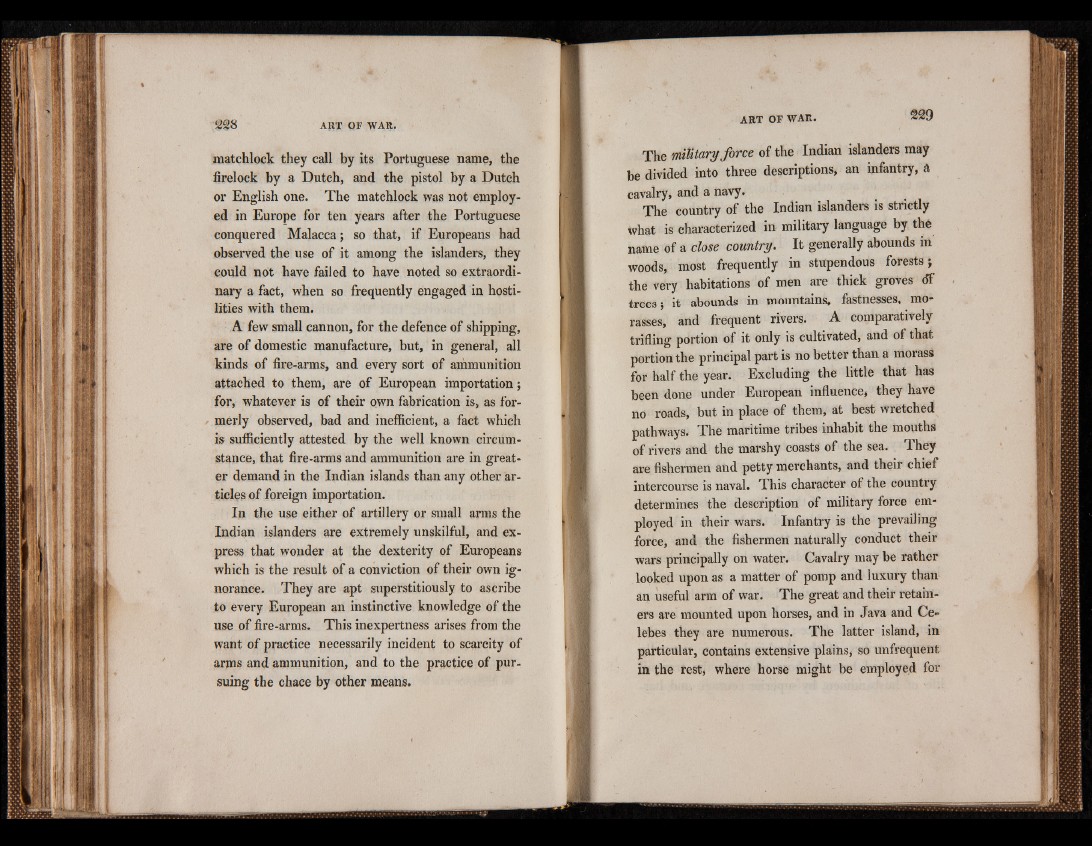
matchlock they call by its Portuguese name, the
firelock by a Dutch, and the pistol by a Dutch
or English one. The matchlock was not employed
in Europe for ten years after the Portuguese
conquered Malacca; so that, if Europeans had
observed the use of it among the islanders, they
could not have failed to have noted so extraordinary
a fact, when so frequently engaged in hostilities
with them.
A few small cannon, for the defence of shipping,
are of domestic manufacture, but, in general, all
kinds of fire-arms, and every sort of ammunition
attached to them, are of European importation;
for, whatever is of their own fabrication is, as formerly
observed, bad and inefficient, a fact which
is sufficiently attested by the well known circumstance,
that fire-arms and ammunition are in greater
demand in the Indian islands than any other articles
of foreign importation.
In the use either of artillery or small arms the
Indian islanders are extremely unskilful, and express
that wonder at the dexterity of Europeans
which is the result of a conviction of their own ignorance.
They are apt superstitiously to ascribe
to every European an instinctive knowledge of the
use of fire-arms. This inexpertness arises from the
want of practice necessarily incident to scarcity of
arms and ammunition, and to the practice of pursuing
the chace by other means.
The m i l i ta r y force of the Indian islanders may
be divided into three descriptions, an infantry, a,
cavalry, and a navy.
The country of the Indian islanders is strictly
what is characterized in military language by thé
name of a close country. It generally abounds in
woods, most frequently in stupendous forests;
the very habitations of men are thick groves df
trees ; it abounds in mountains, fastnesses, mo’*
rasses, and frequent rivers. A comparatively
trifling portion of it only is cultivated, and of that
portion the principal part is no better than a morass
for half the year. Excluding the little that has
been done under European influence, they have
no roads, but in place of them, at best wretched
pathways. The maritime tribes inhabit the mouths
of rivers and the marshy coasts of the sea. They
are fishermen and petty merchants, and their chief
intercourse is naval. This character of the country
determines the description of military force employed
in their wars. Infantry is the prevailing
force, and the fishermen naturally conduct their
wars principally on water. Cavalry may be rather
looked upon as a matter of pomp and luxury than
an useful arm of war. The great and their retainers
are mounted upon horses, and in Java and Celebes
they are numerous. The latter island, in
particular, contains extensive plains, so unfrequent
in the rest, where horse might be employed for